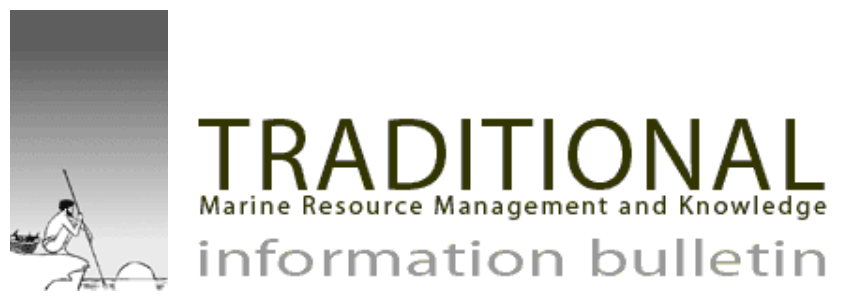
Group Coordinator and Bulletin Editor
Production
Pacific Community, Fisheries Aquaculture and Marine Ecosystems Division, Information Section, SPC, BP D5, 98848 Noumea Cedex, New Caledonia.Note from the editor
In "The value of many small vs. few large marine protected areas in the western Solomon Islands", the first article in this issue, Shankar Aswani and Richard Hamilton describe their work in establishing a network of marine protected areas (MPAs) in the Western Solomon Islands. They summarise the biological and social rationale for setting multiple small reserves within a biogeographical region, and argue that for the Western Solomons, a network of small MPAs is a more biologically effective and socially attainable strategy than establishing a few large reserves. They also suggest that practitioners pay more attention to economic factors and social sustainability issues when establishing MPAs, rather than focusing on just their intrinsic biological and ecological value. Aswani and Hamilton outline some lessons learned and the necessary steps involved in reaching committed community participation for the long-term sustainment of MPAs.
The overarching management goal is to establish a network of MPAs in the Roviana and Vonavona region of the Western Solomon Islands. Twelve have been established so far. These projects also work toward fulfilling local developmental needs by establishing long-term cash enterprises, assisting with infrastructural development (e.g. three clinics, three schools, three community halls, and two women’s halls, among other things), and assisting in educational capacity building.
In this issue we are adding a new service feature. Following Aswani and Hamilton’s article, we include abstracts of these authors’ recently published articles. In future issues of the bulletin, we will try to provide the same service, whenever possible.
The other article in this issue, "The context of gendered knowledge: A comprehensive minimum dataset on women in coastal communities" is authored by Reiko Omoto, a graduate student in the School of Policy Studies, Kwansei Gakuin University, Japan. Ms Omoto’s objective is to make a first attempt at preparing a comprehensive minimum database for use in field research on women’s activities in fishing communities, specifically for understanding the background for her further studies of gendered knowledge in resource use and management. After briefly outlining the contents and shortcomings of other such databases and field instruments, she describes 18 topics with a total of 297 questions, that comprise the components of the database. This instrument places special emphasis on information needed to implement income-generating activities for women.
Kenneth Ruddle
Contents
(pdf: 407 KB)
(pdf: 55 KB)

